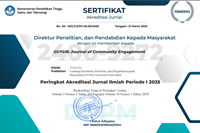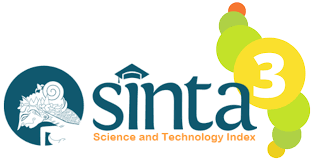Ahmad, Y., Syam, R. C., Nurazizah, A., Maylania, N., Irwan, N. A., Dwiadirah, N. H., Wahyuni, K., Maulana, F., & Rachmat, M. (2022). Penyuluhan Pemilahan Sampah untuk Meningkatkan Pengetahuan Kader di Desa Sanrobone, Sulawesi Selatan. Jurnal Abmas Negeri (JAGRI), Volume 3, Issue 1, page 62–69. https://doi.org/10.36590/jagri.v3i1.323
Ajay, S. V., & Prathish, K. P. (2024). Dioxins emissions from bio-medical waste incineration: A systematic review on emission factors, inventories, trends and health risk studies. In Journal of Hazardous Materials (Vol. 465). https://doi.org/10.1016/j.jhazmat.2023.133384
Alnezami, S., Lamaa, G., Pereira, M. F. C., Kurda, R., de Brito, J., & Silva, R. V. (2024). A sustainable treatment method to use municipal solid waste incinerator bottom ash as cement replacement. Construction and Building Materials, Volume 423. https://doi.org/10.1016/j.conbuildmat.2024.135855
Amalia Ardianti, D. (2019). Rancang Bangun Alat Pengkonversi Sampah Plastik Menggunakan Metode Pirolisis menjadi Bahan Bakar Minyak dalam Upaya Penanganan Masalah Lingkungan. Jurnal Ilmu Dan Inovasi Fisika, Volume 3, Issue 2. https://doi.org/10.24198/jiif.v3i2.23152
An, Y., Liu, H., Wang, Z., Ma, Y., & Wang, X. (2024). Optimization of corrosion resistance and mechanical properties of Al2O3-Cr2O3 refractories for waste incinerator. International Journal of Applied Ceramic Technology, Volume 21, Issue 2. https://doi.org/10.1111/ijac.14581
Aruan, N. M., Manalu, I. P., Prihartantyo, A., Samosir, A. M., Siahaan, H. M., Dodo, S., & Simangunsong, D. (2021). Peningkatan usaha pengolahan kemiri di kecamatan laguboti. Seminar Nasional Hasil Penelitian Dan Abdimas, 6.
Asri, M. N. (2022). Pengaruh Edukasi Gizi Menggunakan Media Booklet Terhadap Pengetahuan Dan Sikap Ibu Hamil Tentang Asi Eksklusif Untuk Pencegahan Stunting. Diploma Thesis, Universitas Andalas, 14(1). https://doi.org/10.31964/jr-panzi.v5i1.178
Kasih Bratha, R. W., & Putri, N. R. (2023). Inovasi Teknologi Pirolisis Sederhana Pengolah Sampah Plastik Menjadi Bahan Bakar Minyak (KEROSENE). Jurnal Studi Inovasi, Volume 3, Issue 2, page 132. https://doi.org/10.52000/jsi.v3i2.132
Kumar, S., & Singh, D. (2024). From waste to resource: Evaluating the possibility of incinerator bottom ash composites for geotechnical applications. International Journal of Environmental Science and Technology, Volume 21, Issue 1. https://doi.org/10.1007/s13762-023-04919-4
Lin, T., Liao, Y. fen, Dai, T. hua, & Ma, X. qian. (2024). Co-disposal technology for sludge and municipal solid waste based on SNCR optimization. Energy, 292. https://doi.org/10.1016/j.energy.2024.130582
Nurwati, S., Mulyani, B. R., Romiaty, Rahmiati, Ulfah, M. S., Zulaika, T., & Sarie, F. (2023). Pelatihan Pemilahan Sampah dan Pemanfaatan Sampah Anorganik Untuk Craft dengan Prinsip Do It Yourself (DIY) pada Kelompok Milenial Kota Palangka Raya. Jurnal Pengabdian Kampus, Volume 10, Issue 2, page 114–123. https://doi.org/10.52850/jpmupr.v10i2.9199
Priyono, P., Supit, S. W. M., Kumaat, A., & Sirun, A. (2021). Diseminasi Alat Destilasi Pembuatan Bahan Bakar Minyak dari Sampah Plastik Tipe PP dan LDPE di Desa Minanga Timur. Prosiding Konferensi Nasional Pengabdian Kepada Masyarakat Dan Corporate Social Responsibility (PKM-CSR), Volume 4, Issue 1, page 1261. https://doi.org/10.37695/pkmcsr. https://doi.org/10.37695/pkmcsr.v4i0.1261
Qadri, U., Wahyuni, R., & Listiyawati, L. (2020). Inovasi Manajemen Pengelolaan Sampah yang Berwawasan Lingkungan di Kota Pontianak berbasis Aplikasi. Eksos, Volume 16, Issue 2, page 144–160. https://doi.org/10.31573/eksos.v16i2.175
Saptenno, M. J., Saptenno, L. B., & Timisela, N. R. (2022). Faktor Yang Mempengaruhi Tingkat Kesadaran Masyarakat Pesisir Terhadap Pengelolaan Sampah di Perairan Teluk Ambon Kota Ambon. Jurnal Ilmu Lingkungan, Volume 20, Issue 2, page 365–374. https://doi.org/10.14710/jil.20.2.365-374
Sari, A., Iswati, S. R., Amirah, S. N., Cahyani, D. A., Nurrizkika, Y. A., Fourlina, H., Irhas, M., Dika, A. A., Pebrian, T., Lestari, N. M. D. A. A., & Murniati, M. (2023). PEMANFAATAN DRUM BEKAS SEBAGAI BAHAN PEMBUATAN TEMPAT SAMPAH BAKAR DI DESA WAJAGESENG. Jurnal Warta Desa (JWD), 5(2). https://doi.org/10.29303/jwd.v5i2.260
Surapati, A., Kurniawan, A., Sari, J. P., & Belladona, M. (2023). Inovasi Mesin Pencair Plastik Untuk Produksi Paving Blok Ramah Lingkungan. Jurnal Abdimas BSI: Jurnal Pengabdian Kepada Masyarakat, Volume 6, Issue 2. https://doi.org/10.31294/jabdimas.v6i2.14558
Suwandi, W. S. (2022). Do Economic Growth, Income Distribution, and Investment Reduce Poverty Level? Jurnal Berkala Ilmiah Efisiensi, Volume 1, Issue 1. https://doi.org/10.1016/j.jimonfin.2018.06.012
Taufiq, A., & Maulana, M. F. (2015). Sosialisasi Sampah Organik dan Non Organik Serta Pelatihan Kreasi Sampah. Inovasi Dan Kewirausahaan, Volume 4, Issue 1, page 68–73.
Tsunematsu, M., Oshita, K., Kawai, T., Shiota, K., & Takaoka, M. (2024). Behaviors and emission inventories of microplastics from various municipal solid waste incinerators in Japan. Journal of Material Cycles and Waste Management, Volume 26, Issue 2. https://doi.org/10.1007/s10163-023-01804-7
UU Republik Indonesia, Munawir, M., Nasional, B. S., Susanta, G., Jatimnet.com, MajaMojokerto.net, Radarmojokerto.jawapos.com, Wijayakusuma, D. M. S., Nahman, A., Godfrey, L., Jacobsen, R., Buysse, J., Gellynck, X., Bayu, D., Depkes, R., Soekidjo Notoatmodjo, Boulanger, L., Ismoyo, I. H., Tarigan, R., … Sanyal, S. (2022). PENENTUAN ALTERNATIF LOKASI TEMPAT PEMBUANGAN AKHIR (TPA) SAMPAH DI KABUPATEN SIDOARJO. Energies, 15(1).
Zhuo, X., Li, M., Cheng, Q., & Luo, Z. (2024). Experimental Studies on the Combustion Characteristics of Multisource Organic Solid Waste for Collaborative Disposal Using Municipal Solid Waste Incinerators. ACS Omega, 9(2). https://doi.org/10.1021/acsomega.3c08369


 (Universitas Islam Negeri K.H. Abdurrahman Wahid Pekalongan)
(Universitas Islam Negeri K.H. Abdurrahman Wahid Pekalongan) 









.png)

